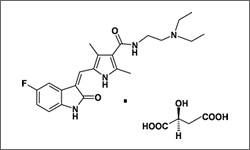Sunitinib

Sunitinib was approved by the FDA in 2006 to treat two different types of cancers: gastrointestinal stromal tumors (GIST) after disease progression on imatinib mesylate (Gleevec®) or when the patient is intolerant of imatinib in the case of metastatic renal cell carcinoma (MRCC). Sunitinib is administered orally, with or without food.
Sunitinib (Sutent®) is a small molecule that functions as a receptor tyrosine kinase (RTK) inhibitor. These receptors are proteins found on the surface of cells and are involved in cellular signaling. The drug inhibits several different receptor proteins including vascular endothelial growth factor receptor (VEGFR), platelet derived growth factor receptor (PDGFR), and stem cell factor receptor (KIT). Inhibition of these receptors prevents the formation of signals that result in tumor growth, angiogenesis and metastasis.1
The diagram below shows the 3D molecular structure of Sunitinib.
- 1 Sutent: Prescribing Information. Pfizer Inc. 2015. [http://labeling.pfizer.com/ShowLabeling.aspx?id=607]
Common side effects include fatigue, swelling, taste changes, nausea, vomiting, high blood pressure, mouth pain/irritation, upset stomach, constipation, diarrhea, skin changes (yellowing, dry, cracking), bleeding (nose bleeds, excessive bleeding from cuts). Possible serious side effects include heart problems - inform your doctor if you fell extremely tired, short of breath, or experience swelling in the feet or ankles, hole in the stomach or bowels or bleeding from the tumor (both very rare) - inform your doctor if you experience pain or swelling it the abdomen, are vomiting blood or having abnormally black bowel movements. Be sure to inform your doctor about all your pre-existing medical conditions before taking sunitinib. Also, tell your doctor about any prescription medications, over-the-counter drugs, supplements, vitamins, and herbal products. 1
- 1 Sutent: Prescribing Information. Pfizer Inc. 2015. [http://labeling.pfizer.com/ShowLabeling.aspx?id=607]
